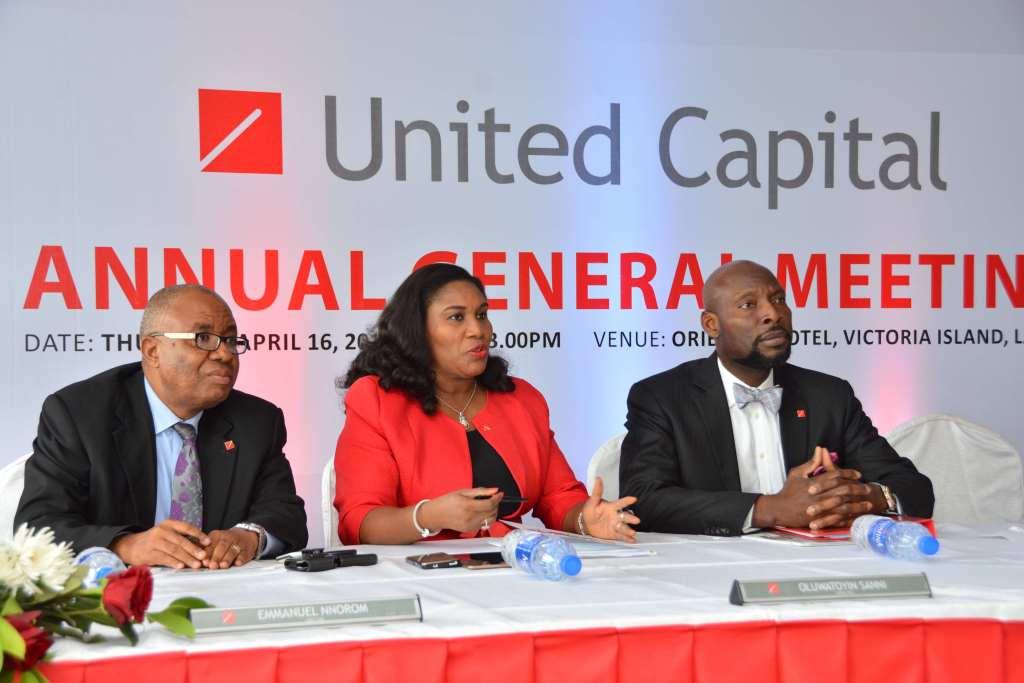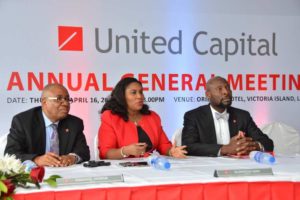Economy
United Capital Plc, Others Back African SMEs with €77m


By Modupe Gbadeyanka
Leading African investment banking group, United Capital Plc, has entered into partnership with global financial and corporate institutions to set up a Franco-African Investment Fund (FFA), with investible funds of €77 million.
According to a statement issued by the firm on Tuesday, the aim of the fund is to accelerate the growth of innovative and entrepreneurial African and French small and medium scale enterprises (SMEs) with development projects on both continents.
It is important to note that this is the first cross border investment fund dedicated to the development of African and French SMEs, and will have a lifespan of 10 years.
The agreement to set up the fund was signed in Bamako, Mali on Saturday at the sideline of the Franco African Summit which was witnessed by the Malian President Ibrahim Boubacar Keita, French President Francois Hollande amongst other global leaders in the private and public sectors.
Bunmi Akinremi, The Deputy Group CEO of United Capital Plc, signed on behalf of United Capital, a limited partner on the French Africa Fund.
Other investors in the Franco-African Investment Fund apart from United Capital include: Societe Generale, Orange, BpiFrance, Africinvet, Caisse Nationale de Prevoyance Sociale of CDI, Proparco (AFD), SAHAM from Morocco, Financecom, the pension fund of the Central Bank of Kenya and other private investors in Kenya. The fund is sponsored by BpiFrance and Africinvet.
Beyond financial performance, particular attention will be paid to the positive impact of the Fund’s investments in terms of governance, transparency, job creation, and respect for social and environmental values.
The participation by United Capital is considered symbolic as it portends a strategic inroad into the continent, which would see it play big in an emerging continental economy. According to Akinremi, ‘The French government wants to explore growth markets and Africa has been identified as another area of growth. United Capital is keen to encourage the expansion of economic opportunity for Africa’.
Group Chief Executive Officer Oluwatoyin Sanni explained, “United Capital is committed to expanding its investment horizon and identifying prime opportunities to grow returns for its investors not just in Nigeria but on the African continent. The purpose of the fund aligns with what United Capital seeks to achieve in Africa”
The Fund will be split into half, with 50 percent to be invested in French SMEs who have interest in doing business in and with Africa and the other 50 percent will be invested in African SMEs. FFA will invest primarily in African SMEs with high growth potential in order to create champions of regional and even continental statures.
Beyond capital contribution, the Fund managers will assist French companies to grow in Africa and, conversely, African companies in their growth strategy in France and Europe.
Economy
Again, OPEC Cuts 2024, 2025 Oil Demand Forecasts

By Adedapo Adesanya
The Organisation of the Petroleum Exporting Countries (OPEC) has once again trimmed its 2024 and 2025 oil demand growth forecasts.
The bloc made this in its latest monthly oil market report for December 2024.
The 2024 world oil demand growth forecast is now put at 1.61 million barrels per day from the previous 1.82 million barrels per day.
For 2025, OPEC says the world oil demand growth forecast is now at 1.45 million barrels per day, which is 900,000 barrels per day lower than the 1.54 million barrels per day earlier quoted.
On the changes, the group said that the downgrade for this year owes to more bearish data received in the third quarter of 2024 while the projections for next year relate to the potential impact that will arise from US tariffs.
The oil cartel had kept the 2024 outlook unchanged until August, a view it had first taken in July 2023.
OPEC and its wider group of allies known as OPEC+ earlier this month delayed its plan to start raising output until April 2025 against a backdrop of falling prices.
Eight OPEC+ member countries – Saudi Arabia, Russia, Iraq, United Arab Emirates, Kuwait, Kazakhstan, Algeria, and Oman – decided to extend additional crude oil production cuts adopted in April 2023 and November 2023, due to weak demand and booming production outside the group.
In April 2023, these OPEC+ countries decided to reduce their oil production by over 1.65 million barrels per day as of May 2023 until the end of 2023. These production cuts were later extended to the end of 2024 and will now be extended until the end of December 2026.
In addition, in November 2023, these producers had agreed to voluntary output cuts totalling about 2.2 million barrels per day for the first quarter of 2024, in order to support prices and stabilise the market.
These additional production cuts were extended to the end of 2024 and will now be extended to the end of March 2025; they will then be gradually phased out on a monthly basis until the end of September 2026.
Members have made a series of deep output cuts since late 2022.
They are currently cutting output by a total of 5.86 million barrels per day, or about 5.7 per cent of global demand. Russia also announced plans to reduce its production by an extra 471,000 barrels per day in June 2024.
Economy
Aradel Holdings Acquires Equity Stake in Chappal Energies

By Aduragbemi Omiyale
A minority equity stake in Chappal Energies Mauritius Limited has been acquired by a Nigerian energy firm, Aradel Holdings Plc.
This deal came a few days after Chappal Energies purchased a 53.85 per cent equity stake in Equinor Nigeria Energy Company Limited (ENEC).
Chappal Energies went into the deal with Equinor to take part in the oil and gas lease OML 128, including the unitised 20.21 per cent stake in the Agbami oil field, operated by Chevron.
Since production started in 2008, the Agbami field has produced more than one billion barrels of oil, creating value for Nigerian society and various stakeholders.
As part of the deal, Chappal will assume the operatorship of OML 129, which includes several significant prospects and undeveloped discoveries (Nnwa, Bilah and Sehki).
The Nnwa discovery is part of the giant Nnwa-Doro field, a major gas resource with significant potential to deliver value for Nigeria.
In a separate transaction, on July 17, 2024, Chappal and Total Energies sealed an SPA for the acquisition by Chappal of 10 per cent of the SPDC JV.
The relevant parties to this transaction are working towards closing out this transaction and Ministerial Approval and NNPC consent to accede to the Joint Operating Agreement have been obtained.
“This acquisition is in line with diversifying our asset base, deepening our gas competencies and gaining access to offshore basins using low-risk approaches.
“We recognise the strategic role of gas in Nigeria’s energy future and are happy to expand our equity holding in this critical resource.
“We are committed to the cause of developing the significant value inherent in the assets, which will be extremely beneficial to the country.
“Aradel hopes to bring its proven execution competencies to bear in supporting Chappal’s development of these opportunities,” the chief executive of Aradel Holdings, Mr Adegbite Falade, stated.
Economy
Afriland Properties Lifts NASD OTC Securities Exchange by 0.04%

By Adedapo Adesanya
Afriland Properties Plc helped the NASD Over-the-Counter (OTC) Securities Exchange record a 0.04 per cent gain on Tuesday, December 10 as the share price of the property investment rose by 34 Kobo to N16.94 per unit from the preceding day’s N16.60 per unit.
As a result of this, the market capitalisation of the bourse went up by N380 million to remain relatively unchanged at N1.056 trillion like the previous trading day.
But the NASD Unlisted Security Index (NSI) closed higher at 3,014.36 points after it recorded an addition of 1.09 points to Monday’s closing value of 3,013.27 points.
The NASD OTC securities exchange recorded a price loser and it was Geo-Fluids Plc, which went down by 2 Kobo to close at N3.93 per share, in contrast to the preceding day’s N3.95 per share.
During the trading session, the volume of securities bought and sold by investors increased by 95.8 per cent to 2.4 million units from the 1.2 million securities traded in the preceding session.
However, the value of shares traded yesterday slumped by 3.7 per cent to N4.9 million from the N5.07 million recorded a day earlier, as the number of deals surged by 27.3 per cent to 14 deals from 11 deals.
Geo-Fluids Plc remained the most active stock by volume (year-to-date) with 1.7 billion units sold for N3.9 billion, trailed by Okitipupa Plc with 752.2 million units valued at N7.8 billion, and Afriland Properties Plc with 297.5 million units worth N5.3 million.
Also, Aradel Holdings Plc remained the most active stock by value (year-to-date) with 108.7 million units worth N89.2 billion, followed by Okitipupa Plc with 752.2 million units valued at N7.8 billion, and Afriland Properties Plc with 297.5 million units sold for N5.3 billion.
-

 Feature/OPED5 years ago
Feature/OPED5 years agoDavos was Different this year
-
Travel/Tourism8 years ago
Lagos Seals Western Lodge Hotel In Ikorodu
-

 Showbiz2 years ago
Showbiz2 years agoEstranged Lover Releases Videos of Empress Njamah Bathing
-

 Banking6 years ago
Banking6 years agoSort Codes of GTBank Branches in Nigeria
-

 Economy2 years ago
Economy2 years agoSubsidy Removal: CNG at N130 Per Litre Cheaper Than Petrol—IPMAN
-

 Banking2 years ago
Banking2 years agoFirst Bank Announces Planned Downtime
-

 Sports2 years ago
Sports2 years agoHighest Paid Nigerian Footballer – How Much Do Nigerian Footballers Earn
-

 Technology4 years ago
Technology4 years agoHow To Link Your MTN, Airtel, Glo, 9mobile Lines to NIN
























